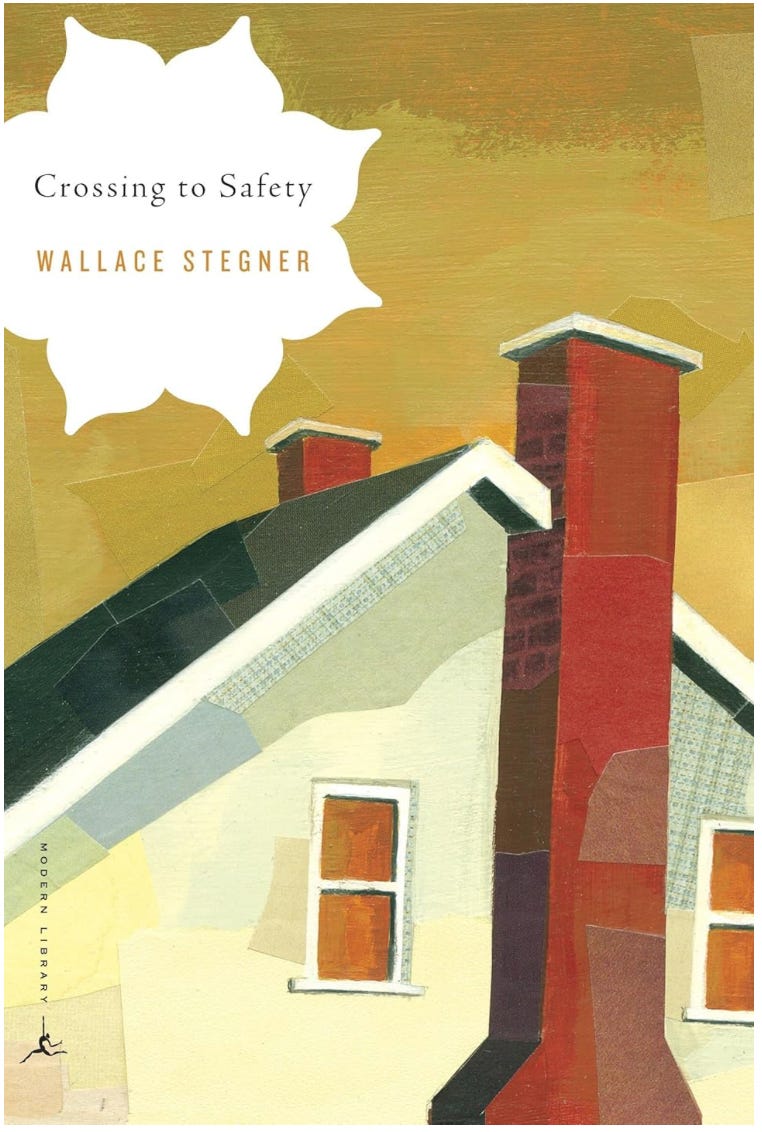Alberta Review: Crossing to Safety
Taking immense delight in finding a new great author everyone's heard about but me
The best and fastest way for this to grow is for you to share the posts within your networks. A forward goes a long way, and the more subscribers we get, the more I’ll be able to write. The writing may change in the next few months to be a bit more entertaining (we hope) so tell your friends!
Books—all stories—are supposed to be about conflict. Inner, outer, forced, accidental, no matter what a story should present to countervailing interests. Either the resolution brings satisfaction, a lack of one invites a second book, or the reader is left in supreme disappointment by a bad ending.
Some stories, though, don’t have conflict. They’re rare, which of course is what makes them stand out. The bad ones are just poorly planned out. These usually have some vapid and forced conflict that amounts to nothing. The best are conflict-free intentionally. My favourite example is the movie Chef. Some things happen. The romp is delightful. The end.
Crossing to Safety by Wallace Stegner is a near-perfect book, and it has no conflict. It nearly arises, from time to time, but he deftly swats it down: “There is a revisionist theory, one of those depth-psychology distortions or half-truths that crop up like toadstools whenever the emotions get infected by the mind, that says we hate worst those who have done the most for us. According to this belittling and demeaning theory, gratitude is a festering sore. Maybe it is, if it is insisted on. But instead of insisting on gratitude, the Langs [the story, generally speaking, revolves around two couples, one rich (the Langs), one much less so, and their pleasant, life-long relationship as friends] insisted that their generosity was selfish, so how could we dislike them for it?”
Stegner’s prose is magical, the kind of writing you’d expect to be more famous; it probably is in literary circles. One of the things about being an amateur reader, rather than a professional, is that you get to come across famous authors you should have heard of but didn’t. I remember the first time I read a book by James Michner, a man whose become by far my favourite writer and prose stylist and whose work spans over 25 novels, numerous pieces of non-fiction, a Pulitzer, and whose first book, Tales of the South Pacific, inspired one of the most famous musicals of all time, South Pacific by Rodgers and Hammerstein. But I digress.
Without conflict, one’s left with a flurry of life lessons:
“I remembered the first time we came here, and what we were then, and that brings to mind my age, four years past sixty. Though I have been busy, perhaps overbusy, all my life, it seems to me now that I have accomplished little that matters, the books have never come up to what was in my head, and that the rewards—the comfortable income, the public notice, the literary prizes, and the honorary degrees—have been tinsel, not what a grown man should be content with.
What ever happened to the passion we all had to improve ourselves, live up to our potential, leave a mark on the world? Our hottest arguments were always about how we could contribute. We did not care about the rewards. We were young and earnest. We never kidded ourselves that we had the political gifts to reorder society or insure social justice…But we all hoped, in whatever way our capacities permitted, to define and illustrate the worth life.”
There are hardships throughout the narrative, which is: the narrator and his wife move to Madison Wisconsin for the narrator to become a professor; the couple meets the wealthy Langs, who own a rural property in Vermont, which becomes the centre of their relationship; some people get sick, the couples travel to Italy. One lives up to his potential, the other flounders. But through it all, relations remain cordial: “I didn’t know myself well, and still don’t. But I did know, and know now, the few people I loved and trusted. My feeling for them is one part of me I have never quarrelled with, even though my relations with them have more than once been abrasive.” If there is conflict, it is from the deus ex machina of disease; even then, it is defeated, morally, if not physically.
The book’s simple but profound story and characters are contrasted with lengthy, evocative prose, very much out of style with the modernists he would’ve been superseding. He is, quite clearly, a conservative man in the sense that his writing is focused on the benefits of family, obligation, duty, and community. However, these lessons are shown, not told, unlike far too many political messages in the modern novel. He also, interestingly enough, spent the years between 7 and 12 in Eastend, Saskatchewan, from 1916 to 1921. His book Wolf Willow: A History, A Story, And A Memory Of The Last Plains Frontier is about that time. I’ve bought it and it will soon be read (and reviewed).
That’s the closest I could get to relating Crossing to Safety to Alberta for this Alberta Review, and it’ll have to do. Otherwise, we’d have to start stretching and, it’s still summer—to me at least—and there’s no need for that.
Alberta Review relies on subscriptions to operate (we hate ads, and they’re kind of pointless). Please consider subscribing to support the publication.
Alberta Review is in no way associated with previous iterations of the publication Alberta Review.


